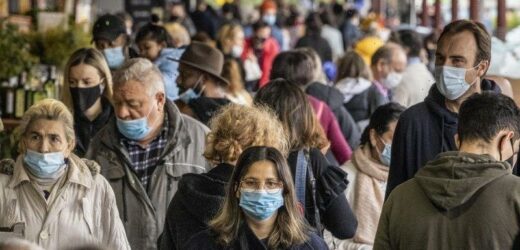One of the ways in which our world has changed in a lasting way as a result of the pandemic is how we work. For many of us the pandemic has transformed this aspect of our lives.
The need to work remotely during the pandemic, and the many benefits that were realised, has shifted the expectations of both employers and employees alike such that the five-day-a-week daily commute as a matter of principle has become a somewhat antiquated notion.
The five-day-a-week daily commute as a matter of principle has become a somewhat antiquated notion.Credit:Chris Hopkins
Of course, most workplaces that were able to go to a completely remote working model will move towards a hybrid model going forward, where the expectation will be that employees spend some days in the office but there is more flexibility to work at home.
This transition has already occurred in many workplaces and is currently occurring in others. It’s thanks to the pandemic that what would have previously been seen as unrealistic is now seen as normal, and actually even ideal.
This is what pandemics do, they change society forever, sometimes in ways that are unexpected.
We shouldn’t lose sight of the fact, however, that the reason we worked from home was to limit contact with each other. Most of the public health interventions in the early days of the pandemic had this same goal of limiting contact with other people.
These interventions collectively played a crucial role of dampening virus transmission and keeping us safe when the only tools in our toolkit for combating virus transmission were pretty rudimentary and were based on the principle that the less we mixed, the less opportunity there was for the virus to spread.
In the world of challenges that we have become accustomed to since 2020 it is clear that we are about to face another as we expect a substantial winter wave of COVID infections driven by the BA.4 and BA.5 variants. This winter wave is a challenge we are going to have to confront, and it’s one that we shouldn’t underestimate. As we consider how to best meet this next challenge, there are several debates playing out.
One of these debates is whether businesses should consider allowing employees to work more from home over the next few months, as advised by the Australian chief medical officer and state chief health officers in the past few days. Some elements of the business sector have come out pretty strongly against this, the argument being that this would threaten our economic recovery.
This pushback is not surprising and is entirely understandable. We have to acknowledge that everything we do to combat virus transmission has a cost, and the business sector has paid a high price going into a third year now. The desire for businesses to move forward and put these types of measures behind them is a natural reaction.
The business sector has paid a high price going into a third year now.Credit:Wayne Taylor
However, there are some echoes in this opposition that hark back to the simplistic notions espoused at the beginning of the pandemic that there was a dichotomous choice between health or the economy in responding to the COVID-19 crisis.
If there was one myth that was categorically smashed during the pandemic, it was that the belief that you couldn’t have one without the other. In fact, it has been shown time and time again that controlling disease transmission leads to better economic outcomes.
The point here is that there is a going to be a significant cost to letting disease run away from us in the next few months. There will be the obvious devastating health cost which will not be limited to those directly due to COVID. But along with that will come a significant social and economic cost.
And so once again, and not for the first time since 2020, the path ahead comes down to the question of which levers to pull as we trade off the benefits of what we do to control transmission against the costs of the public health interventions we implement.
Sidestepping the issue of whether we have gone past the time for mandates, the takeaway message is that we all benefit, including the business sector, in so many ways, by keeping virus transmission as low as possible in the next few critical months. And in trying to do this, we all need to play our part.
As individuals we need to make sure we are fully vaccinated and we need to be more vigilant in masking up in indoor environments. And businesses need to continue their exceptional contribution during the pandemic.
While no one is suggesting that we have to fully revert to a remote work model, giving employees more flexibility to work from home will help keep their employees safe and healthy, will contribute to keeping the community healthy, and will also benefit the economy.
Stay across the most crucial developments related to the pandemic with the Coronavirus Update. Sign up for the weekly newsletter.
Most Viewed in National
From our partners
Source: Read Full Article




